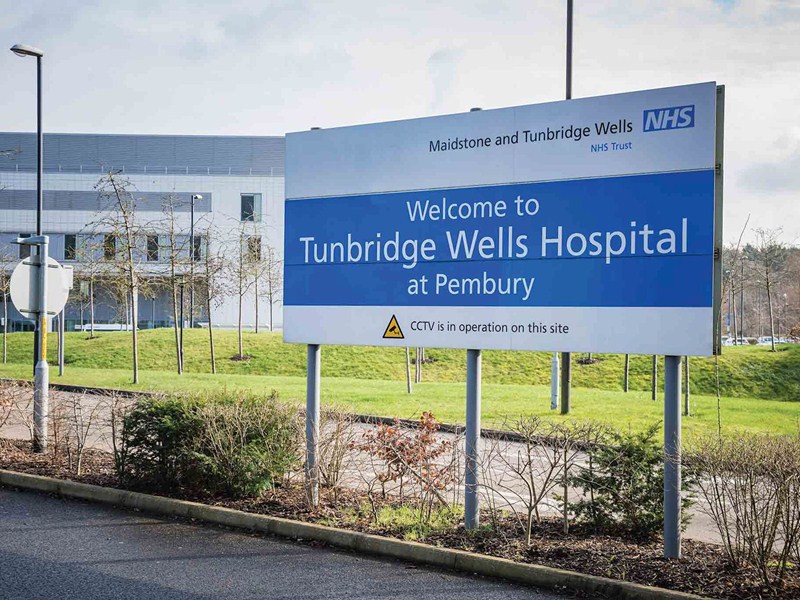EXCLUSIVE by Adam Hignett
Local taxpayers have been left to pick up a £1.7million bill after Tunbridge Wells Hospital successfully lobbied to have its business rates retrospectively reduced, the Times can reveal.
The hospital is understood to have handed out more than £400,000 in commission to agents to fight the case on its behalf.
Borough Council officials have reacted with dismay to the news, which saw a deal between the trust and the Valuation Office Agency (VOA) thrashed out behind closed doors.
The VOA is part of the HMRC and is responsible for setting business rates in the first place which means it ruled on a complaint against itself and it did so in secret.
The row centres on the valuation of Tunbridge Wells Hospital, which until recently had a rateable value of just under £5millon per annum.
Since 2013 the hospital, through the Maidstone and Tunbridge Wells NHS Trust, has been arguing its rate should be reduced.
“What is disappointing is we have been unable to get an explanation from the VOA as to why they reached that settlement in private and what was so wrong with their original calculation?’ said Lee Colyer, Director of Finance at the Borough Council.
Hearings are supposed to be held in public although the Times, which first highlighted the issue in 2016, under-stands that no agendas are made public and no documents prepared beforehand.
Seven dates were set for a hearing into the hospital appeal. Seven times those hearing were cancelled. The eighth date was set for Tuesday May 1 and the council were preparing to attend.
However, the day before the scheduled hearing, it was announced the Trust and the VOA had reached a settlement, which will result in a £1.7million rebate, of which £674,000 has already been paid by the Borough Council.
‘I was notified two weeks ago and we are just about to make the payment now,’ confirmed Lee Colyer.
He said since the appeal began five years ago a ‘provision’ to cover the potential costs has been steadily put aside to limit the effect on daily spending, adding: ‘But the money could still have been put to better use investing locally.’
Smaller segments of the refund will be met by Kent County Council (KCC), and the Fire Service, both of whom are recipients of business rates. Another chunk comes from a ‘collection fund’ accumulated by the council and then passed on to central government.
A KCC spokesman admitted ‘no provision’ has been made for the appeal.
No representatives from either council were invited to attend the hearing in which the settlement was made and ‘taxpayer confidentiality’ has meant no reasoning behind the decision has to be given.
This, as much as the cost of the reimbursement itself, has caused consternation among members of the council.
‘The VOA are meant to defend their original decisions robustly; they must have a lot of evidence to support their original valuation as the government agreed with it and we have been collecting the money dutifully.’
‘Suddenly at a private meeting they cave in. So there may be good reasons why, but we are not privy to those,’ Mr Colyer said.
The council’s frustration is made clear in a strongly worded letter written to MP Greg Clark on May 2 in which they lambast the ‘utterly outrageous’ situation which sees costs ‘shunted’ from one part of the public sector to the other.
Mr Colyer pointed out the ‘anomalies’ of the current system, which sees NHS run hospitals and council run schools forced to pay full business rates, whilst private hospitals and academies benefit from 80 percent rate relief.
Of particular concern for tax-payers, he said, is the fact the Trust had to enlist the help of pri-vate sector agents in the City to lobby on their behalf, who will inevitably want their cut.
Neither the agency itself, Montagu Evans, nor the Hospital would disclose the extent of the fees as the Times went to press, however, in their letter the council estimate around £420,000 will be paid in commission.
Lastly, just under half of what the council has to hand over, £320,000, is money the council never had. It was collected prior to changes introduced in 2013 which saw councils both retain a percentage of business rates locally but also take responsibility for some losses during appeal.
The letter, signed by Council Leader David Jukes and Chief Executive William Benson, says ‘at the very least’ the authority should be reimbursed this sum. Speaking to the Times, Greg Clark acknowledged receipt of the letter, adding: ‘I completely share the Borough Council’s frustration with having to meet retrospectively a loss of business rates income over which they had no control.
‘The Valuation Office Agency has to operate under the existing law but as part of the Government’s review of business rates I will ask the Chancellor to consider how this anomaly can be corrected for the future.’








